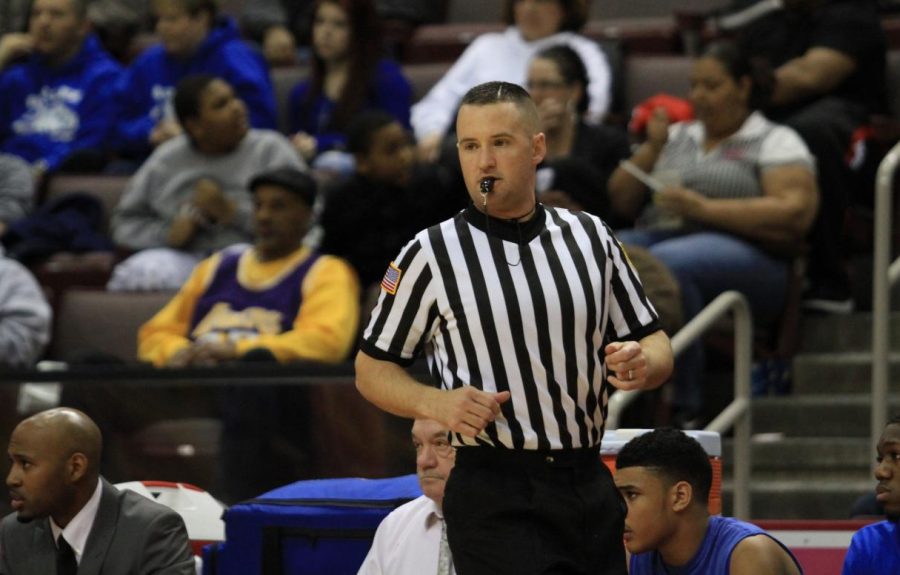“We are ignoring when we should be engaging.”
Kevin Lawrence keeps a close eye on the action as a PIAA basketball official.
September 19, 2019
This ‘Letter to the Editor’ is written by Kevin Lawrence. Lawrence is a social studies teacher at Susquehannock High School, the head varsity baseball coach at Red Lion High School and a basketball official for the PIAA. This column originally appeared in the York Daily Record, but it was shared with the the Courier with permission from Lawrence.
I am a suicide survivor.
I do not meet the definition for being a suicide survivor. But make no mistake, I am surviving my own suicidal thoughts. By the grace of God, I have never attempted to take my own life. But I have considered it, pondered it and planned it in my own mind. It is called suicidal ideation and it is only one on a lengthy list of ways that our nation’s growing mental health crisis is manifesting itself. There are many other ways but, as former Washington State quarterback Tyler Hilinski’s own suicide tragically proved again, it is the most tragic and devastating.
I am scared. This is a terrifying revelation to make. I expect people to snicker and judge, laugh and mock. But if even one person reconsiders their opinion on mental health, reevaluates what they think a person with depression ‘looks like,’ or better yet, makes the intentional decision to be more empathetic to another human being, athlete or not, the courage it took for me to publish these paragraphs is worth it.
According to the National Alliance on Mental Illness (NAMI), suicide is the second leading cause of death among Americans ages 10-34. Not impaired driving. Not undiagnosed heart disorders. Not drug overdoses. Suicide. Besides the malignancy of suicide, there are other mental illness that, left untreated, lead directly to death. Eating disorders have the highest mortality rate of all mental illnesses. While certainly not isolated to student-athletes, negative body image and eating disorders are no less prevalent among athletes. Body image challenges plague not only female athletes but, as a man for whom the struggle is real, males as well. The National Eating Disorders Association (NEDA) reports that 1 in 3 people who are battling an eating disorder is male.
NAMI’s research shows that more than 1 in 5 American teenagers will experience a serious mental illness before their frontal lobes fully develop in their mid 20’s. The American Foundation for Suicide Prevention reports that suicides among 15-24 – the exact age demographic of high school and college student-athletes – has increased steadily since 2000. Each year, more high school and college aged students are taking their own lives.
But when our young people look around and try to interpret the most complex world teenagers have ever faced, they see groups discouraging them from drinking and driving, clinics providing free heart screenings and speakers cautioning the dangers of drug use. At the very same time, our teenage student-athletes are explicitly being given the wrong message about mental health. We are telling our student-athletes, ‘you’re resilient, persevere, work through, be mentally tough.’ Those messages are great ones for our student-athletes to hear within the lines of their competitive arenas; outside of those boundaries, they are absolutely the wrong messages. We are giving them catch phrases instead of effective strategies. We are failing. We are being silent when we should be shouting. We are ignoring when we must be engaging.
We are not intentionally making the distinction between what is an appropriate mental approach on the field or court and what is mentally healthy outside the locker room doors.
And no place is this silence more deafening than in America’s high school and college locker rooms. Study upon study shows that athletes are significantly less likely than non-athletes to report when they are having problems and to seek the help they need to address those challenges. The reasons for this disparity are less obvious than the statistical differences themselves. The reasons matter less than the reality. We have invented this perfect image of the American student-athlete. They have it all – great families, good friends, athletic success, academic accomplishment and positive relationships. We are sending a message to young athletes as early as they can recognize it that they have it all and that they need to do it all. They don’t. They can’t. It is time that we wake up, speak up and acknowledge that our locker rooms are plagued by the same malevolence found in every other corner and crevice of our society.
We need to banish the notion that our student-athletes are ‘10 feet tall and bulletproof.’ We need to destigmatize mental illness. And we absolutely need to create a structure to ensure that competitive athletics teaches all of the right life lessons and supports all of its participants, especially those who need the most support.
American teenagers are facing an existential crisis. And no group is being misfed bad information and taught to misinterpret their emotions more than young athletes.
Our student-athletes will experience failures and successes. Both are valuable. But as our young athletes learn to make sense of those experiences we need to make sure that we as adults, coaches, fans and parents are aware of their challenges, empathetic to their feelings and sensitive to their needs. We need to stop acting as though high school and college student-athletes are leading some charmed life simply by virtue of their physical prowess. We need to quit acting as though the result of a football game on Friday night or Saturday afternoon is a harbinger of the life path of any of the student-athletes who played in it. We need to speak up. This is my attempt to open the conversation.
We don’t make players compete with torn ACL’s. But we do make them play through shredded emotions. We don’t expect players with broken collarbones to play. But we expect teenagers with broken spirits to play, and play well. We are providing them with the equipment their sport requires, helmets, sticks and pads, but we aren’t providing them with the tools their lives necessitate. As quick as we are to buy new equipment, we must be equally committed to teaching our student-athletes coping mechanisms, strategies to build intrapersonal intelligence and instilling in them the courage to speak out.
I am trying to set the example. I am speaking out. I have multiple diagnoses. I have major depressive disorder, anxiety, panic disorder, ADHD and elements of OCD. I coach. I officiate. I struggle. And usually I can cope. But that ability – to cope – is one that I have learned painfully and methodically over the past 21 years. Not enough of our student-athletes are learning the same skills. We have fed them a societal farce that they have the perfect life and we expect them to meet our expectations. It is time we meet theirs.
This fall I’m back in the press box at Susquehannock announcing the Warrior football games. This winter I’ll be back on the basketball court and next spring I’ll be back in Red Lion’s baseball dugout coaching. During each season, I’ll watch the successes and failures of our local student-athletes. Through it all, I hope that you will join me in celebrating the young men and women who compete, not for what they accomplish or what they do, but rather for who they are. We all need to join together to support the people beneath the uniforms and not just celebrate the championships they win and the milestones they surpass. We need to applaud their end rushes and their empathy, their crossovers and their coping skills, their headers and their heartaches.
We are facing a mental health crisis in America. It is being exacerbated by our collective silence. I’m speaking up. Please join me.
If you or someone you know is struggling with thoughts of suicide, reach out to the National Suicide Prevention Lifeline 1-800-273-TALK (8255).
To continue the conversation about how we can destigmatize mental illness in the sports community, to share your own thoughts and experiences, or to invite Kevin to speak to your group, please email him at NOT10feettallandbulletproof@gmail.com.





Fran Lauer • Jun 28, 2021 at 12:08 pm
You coach my grandsons team, I think you are a very effective coach, my favorite out of the few I’ve seen. He’s nine years old so I’m new to little league baseball! . Keep up the good work with all you do for the kids!
. Keep up the good work with all you do for the kids!
I just read your story, I suffer from the same disorders. I continue to struggle even though I’ve been years on medication. I admire you, how you do what you do, teaching, coaching and spreading awareness about mental illness, especially at the teenage level. It’s the root of so many problems in society too! I didn’t know anything about depression until I was 35 years old! I’ve learned a lot since then, although it took a suicide attempt to get me the help and understanding I needed.
Thank you for sharing your story, it’s a brave thing to do! I’ve gotta say, I would have never guessed it in a million years! I think we all tend to look at others lives and assume they have it all together! Don’t get me started on Facebook
Sincerely, Fran Lauer